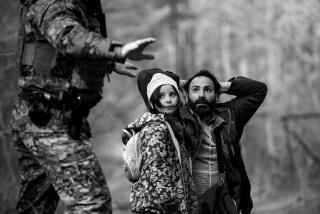BOOK REVIEW : In This Irish Village, the Bad Moods Rage On : A BORDER STATION<i> by Shane Connaughton</i> St. Martin’s Press $14.95, 164 pages
- Share via
The setting here is the line between Independent and Northern Ireland, a forgotten “Border Station” at the edge of a village with only 14 houses.
Young Dan’s father is a sergeant, upholding law and order on the Independent side. Here, they are far from every possible military maneuver, divorced from any kind of event at all. The father yearns for even a civilian murder-- any kind of crime to solve--but must content himself with ticketing bicycles without taillights. Nothing happens in this place. Only existence, dreary and sad.
Dan (his name is mentioned just once), is an only child. He grows up lonely and fearful. As he gets older he will struggle to analyze the dynamic that surrounds him: “He couldn’t work out which was your country--the heart or the brain. They seemed foreign to each other. But either way your parents were among the people who stood on the Border in between. Thoughts had to be smuggled. A fist could easily mash them into chaos.”
Dan has good reason to worry about “the fist.” All the children in the village are regularly beaten by their drunken fathers. (One child is kicked so badly that he’s sent to the hospital for a week.) The village reels under a legacy of poverty, war, boredom; two repressive religions.
Dan’s father seethes with rage. His life is meaningless; he can’t get ahead. Both father and son--perhaps for lack of anything better to do--are locked in all-consuming Oedipal struggle over Dan’s mother. This smoldering sexual battle has been going on for as long as the boy can remember. In a house with three bedrooms, the father sleeps alone on an iron cot. Mother and son sleep together. The spare room stays empty. The boy, by now in school, still suckles from his mother, which may in part account for his father’s ferocious temper.
The boy perceives his mother as all-good: protective, beautiful, a creature who lives on love. His father, on the other hand, is a fistfight waiting to happen. In a swamp of self-loathing and the other, garden-variety loathing, these three lives are played out.
The mother has married beneath her. The father has pulled himself up, out of the mud hut where he was born. Money is desperately short. The whole village is stony broke. Resentments over all these circumstances crackle in the domestic air.
Outside, “Ireland,” under its green surface, is truly a swamp. In each of these seven stories, urine, feces, vomit, mildew, dead piglets, smashed eggs, chicken excrement swirl through the narrative. For Dan’s family, it’s like living at the bottom of a garbage pail.
And yet, these village people manage a certain courage and lovableness. After a bitter fight with the grocer over debts, Dan is sent to buy the daily milk at a neighboring farm. A lonely bachelor lives there, in splendor gone to seed. His chip-and-dale furniture has chickens strolling over it. His yard is a river of chicken waste. His ancient mother has ulcerating sores. His deformed brother drools. Yet all these people are kind.
But life has got them down. The sun never comes out. The hay never dries. The rain never stops. Nothing ever happens except the slow slip of time going by. The seven stories here move as slowly as the lives they describe.
Dan (again, named only once) must grow up, leave his mother’s bed, give up her breast--finally. He must goad his father until he finally receives the blow he has dreaded from the first. He must go outside the house, help neighboring farmers with their chores, meet a few Protestants, even cross the Border, though in its arbitrary twistings and turnings that border is truly meaningless.
There are a few spots of happiness here. The fiery Protestant girl invites the boy into her bedroom, to “snap her garter for God.” The boy and a Protestant friend stow away in this Protestant vamp’s van one Sunday to watch this temptress preach a fire-and-brimstone sermon on the beach.
But for the most part, “The Border Station” is vomit and urine, feces and stillbirths, and bad moods that go on for days at a time: “Moods with a soul’s smelly breath. Its voice was silent crying.” Sentences like this make me feel that this book, though sincere and heartfelt, is not for everyone.
Next: Lee Dembart reviews “Journey Through Genius: The Great Theorems of Mathematics” by William Dunham.
More to Read
Sign up for our Book Club newsletter
Get the latest news, events and more from the Los Angeles Times Book Club, and help us get L.A. reading and talking.
You may occasionally receive promotional content from the Los Angeles Times.










